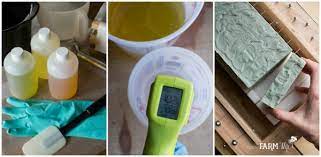Making your own soap at home can be a fun pastime, allowing you to create unique and personalized products for personal use or gifting. You can also do it as a business and sell your handmade soap to others for profit. If you’re considering this craft, you must first understand the ingredients required to make soap. Here are eight soap making supplies you need to get started:
Lye
Lye, also known as sodium hydroxide or caustic soda, helps saponification, turning oils and fats into soap. Fats and oils on their own cannot mix with water. Lye breaks down the molecules of fats and oils, allowing them to mix with water and create soap. Lye also gets neutralized during the process, making it safe for use in soap. Since lye is a strong and corrosive chemical, handle it properly to prevent skin and eye irritation. When working with lye, gloves, goggles, respirators, proper labeling, suitable equipment, and a well-ventilated area are necessary.
Soap Dyes
Soap dyes are other soap making supplies you may need for your projects, depending on your needs and preferences. Soap doesn’t have to be just functional and boring; you can add colors to make it more attractive. The two main options for soap coloring are mica colorants and soap color bars. Mica colorants are powders that come in various shades and are known for their shimmer and sparkle. Soap color bars are solid blocks with concentrated colors that you can melt into a soap mixture to achieve the desired hues. Both options are skin-safe and provide many possibilities for creating colorful soap.
Soap Molds
Molds help shape and hold the soap as it hardens. They come in various shapes, sizes, and materials, such as silicone, plastic, wood, and metal. Silicone molds are popular due to their flexibility and ease of use. They also come in unique shapes and designs, helping you create custom soap. Plastic molds are affordable and easy to find, while wooden molds provide a traditional touch to your soap making. Metallic molds are durable and suitable for creating larger batches of soap. Consider getting different molds to experiment with different soap designs.
Essential Oils and Fragrance Oils
To make your soaps stand out, essential oils and fragrance oils are soap making supplies that can help by adding scent. Essential oils are concentrated plant extracts that provide natural scents and therapeutic benefits. Some common essential oils used in soap making include lavender, peppermint, tea tree, and eucalyptus. Fragrance oils are synthetic scents such as fruits, flowers, or spices. They offer many options for adding unique and long-lasting fragrances to your soap. Choose quality oils and follow recommended usage rates for best results.
Soap Bases
If you’re new to soap making and want to start with an easier option, consider soap bases. Soap bases come pre-made and only require melting, adding additives, and pouring into molds. They usually consist of oils, glycerin, and other ingredients. You can also find bases in liquid form that don’t require melting. Soap bases are a convenient option for beginners or those who want to focus on customizing scents and additives rather than the soap making process itself. Whether you prefer melt-and-pour soap bases or liquid ones, they’re readily available and easy to find.
Additives
Additives are soap making supplies that can enhance the appearance or benefits of your soap. Some popular additives include chia, sesame, fennel, cardamom, dill, cumin, celery, and many others. Seeds add texture and exfoliation to the soap, making it more effective in removing dead skin cells and promoting circulation. You can also use herbs, spices, dried flowers, clays, activated charcoal, or coffee grounds for added benefits and visual appeal. Research the recommended usage rates for each additive to avoid any unwanted effects.
Packaging and Labels
Once your soap is ready, you’ll need proper packaging and labeling to protect and identify your product. You can choose kraft brown boxes, cellophane bags, shrink-wrap bags, or other options for packaging. Consider eco-friendly, durable, and visually appealing packaging materials. Labels help list ingredients, allergens, expiration dates, and other necessary information for customers. They also add a professional touch to your product. Follow labeling guidelines and regulations for soap products in your area.
Soap Making Books
Soap making books can provide step-by-step instructions, tips, and recipes for creating different soap types. They may also cover safety precautions, equipment, ingredients, and troubleshooting common issues. You can find many beginner-friendly or advanced books for experienced soap makers looking to expand their skills. Add some soap-making books to your collection for inspiration and guidance.
Get the Right Soap Making Supplies
Creating handmade soap can be a fulfilling and enjoyable hobby or business. The right soap making supplies can help you produce high-quality, unique soaps you and your customers will love. Experiment with different ingredients, designs, and techniques to find your soap making style. Keep learning and improving your skills to create more beautiful and beneficial handmade soap.

